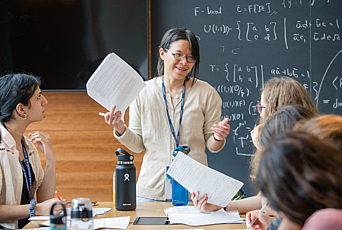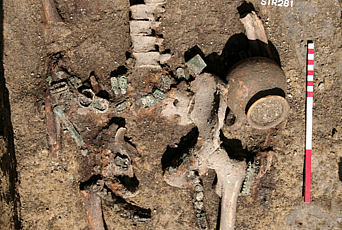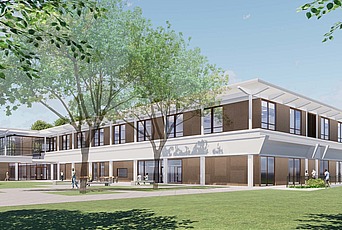IAS Launches Jonathan M. Nelson Center for Collaborative Research
Press Contact

The Institute for Advanced Study is launching the Jonathan M. Nelson Center for Collaborative Research, expanding the Institute’s capacity for discovery across fields.
The Nelson Center for Collaborative Research is designed to facilitate work on projects and topics that are beyond the reach of a single scholar, discipline, or institution. It will support team-based, theme-based, inter-institutional, and interdisciplinary projects led by Institute scholars in collaboration with researchers across and beyond academia. The Nelson Center will provide seed funding to develop early-stage research ideas, large-scale funding for multi-year research agendas, and the space, infrastructure, and expertise for collaborative projects with partners across the globe.

“Since its founding, the Institute’s mission has been to create a research community in which talented individuals from all over the world have been able to realize their highest capacity for discovery, uninhibited by boundaries of dogma or discipline,” said David Nirenberg, IAS Director and Leon Levy Professor. “The Nelson Center strengthens our ability to fulfill that mission into our second century, and expands our ability to explore what Director J. Robert Oppenheimer called ‘the synapses’ between the sciences, humanities and arts, and society.”
The Nelson Center for Collaborative Research is made possible by a generous donation from Trustee Jonathan M. Nelson, Founder and Chairman of Providence Equity Partners LLC and Co-Founder and Executive Chairman of Dynasty Equity.
“The goals of the Nelson Center are ambitious but consistent with the mission of the Institute. We know that breakthrough discoveries and advancement in deep understanding of profound questions often occur at the boundaries of disciplines. We see this both in the results of collaborations of diverse talent and in the work of individuals who have the rare ability to cross traditional disciplinary boundaries,” said Nelson. “Recognizing this fundamental property of breakthrough learning, the Center’s goal is to encourage and support such work. This initiative, which adds a new dimension to study at the Institute by increasing the reach of research by Institute Faculty, builds on our historic record of excellence, and expands our relationships with thought leaders around the world. Along with others, I am proud to support this new Center and its important goals.”

The Nelson Center for Collaborative Research has also received generous support from the Gerard B. Lambert Foundation. It will be led by executive director David Zielinski, who is currently the executive director of Harvard Catalyst and associate dean for clinical and translational research at Harvard Medical School. Zielinski will join the Institute on August 1, 2024.
Nirenberg and Institute Faculty began developing the idea for the Center more than two years ago, as they discussed the best ways to support foundational scholarship and to extend the types of research at which the Institute excels. They focused on three key needs: new human and financial capital to support collaborative or multidisciplinary research; increased capacity for large-scale projects; and the physical and administrative infrastructure to support projects across and outside the Institute’s four schools of Historical Studies, Social Science, Natural Sciences, and Mathematics.

“My scholarship takes place at the intersection of different fields, including the natural sciences and their technological applications, the study of the social world, and policy analysis and research,” said Alondra Nelson, Harold F. Linder Professor in the School of Social Science and leader of the Science, Technology, and Social Values Lab. “The establishment of the Center provides new opportunities to anchor that work and convene intellectual leaders here at the Institute, enhancing and extending the impact of our collective efforts.”
The Nelson Center will launch its first call for proposals this Fall, with the goal of encouraging and supporting the Faculty’s most ambitious plans for collaborative research.
“The Institute is a living experiment, and, to remain vital, it must evolve and, at times, take risks on new directions,” said Akshay Venkatesh, Robert and Luisa Fernholz Professor in the School of Mathematics. “The Nelson Center creates a space where we can do just that.”
About the Institute
The Institute for Advanced Study has served as one of the leading independent centers for theoretical research and intellectual inquiry since its establishment in 1930, advancing the frontiers of knowledge across the sciences and humanities. From founding IAS Faculty Albert Einstein, Erwin Panofsky, and John von Neumann to influential figures Emmy Noether, George Kennan, and J. Robert Oppenheimer to the foremost thinkers of the present, IAS is dedicated to enabling independent inquiry and fundamental discovery.
Each year, the Institute welcomes more than 250 of the world’s most promising post-doctoral researchers and scholars who are selected and mentored by a permanent Faculty, all of whom are preeminent leaders in their fields. Among present and past Faculty and Members, there have been 35 Nobel Laureates, 44 of the 62 Fields Medalists, and 23 of the 27 Abel Prize Laureates, as well as winners of the Turing Award; the Pulitzer Prize in History; the Wolf, Holberg, and Kluge prizes; and many MacArthur and Guggenheim fellows, among other honors.


